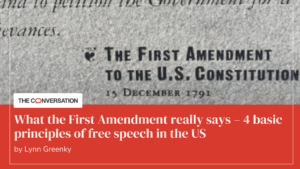What the First Amendment really says – 4 basic principles of free speech in the US | The Conversation

Elon Musk has claimed he believes in free speech no matter what. He calls it a bulwark against tyranny in America and promises to reconstruct Twitter, which he now owns, so that its policy on free expression “matches the law.” Yet his grasp of the First Amendment – the law that governs free speech in the U.S. – appears to be quite limited. And he’s not alone.
I am a lawyer and a professor who has taught constitutional concepts to undergraduate students for over 15 years and has written a book for the uninitiated about the freedom of speech; it strikes me that not many people educated in American schools, whether public or private – including lawyers, teachers, talking heads and school board members – appear to have a working knowledge about the right to free speech embedded in the First Amendment of the U.S. Constitution.
But that doesn’t have to be the case.
In short, the First Amendment enshrines the freedom to speak one’s mind. It’s not written in code and does not require an advanced degree to understand. It simply states…Read More
Lynn Greenky. is a Professor Emeritus at Syracuse University, where she taught a beloved undergraduate course about the First Amendment for 10 years. She continues to write and speak about the First Amendment and is the author of When Freedom Speaks.